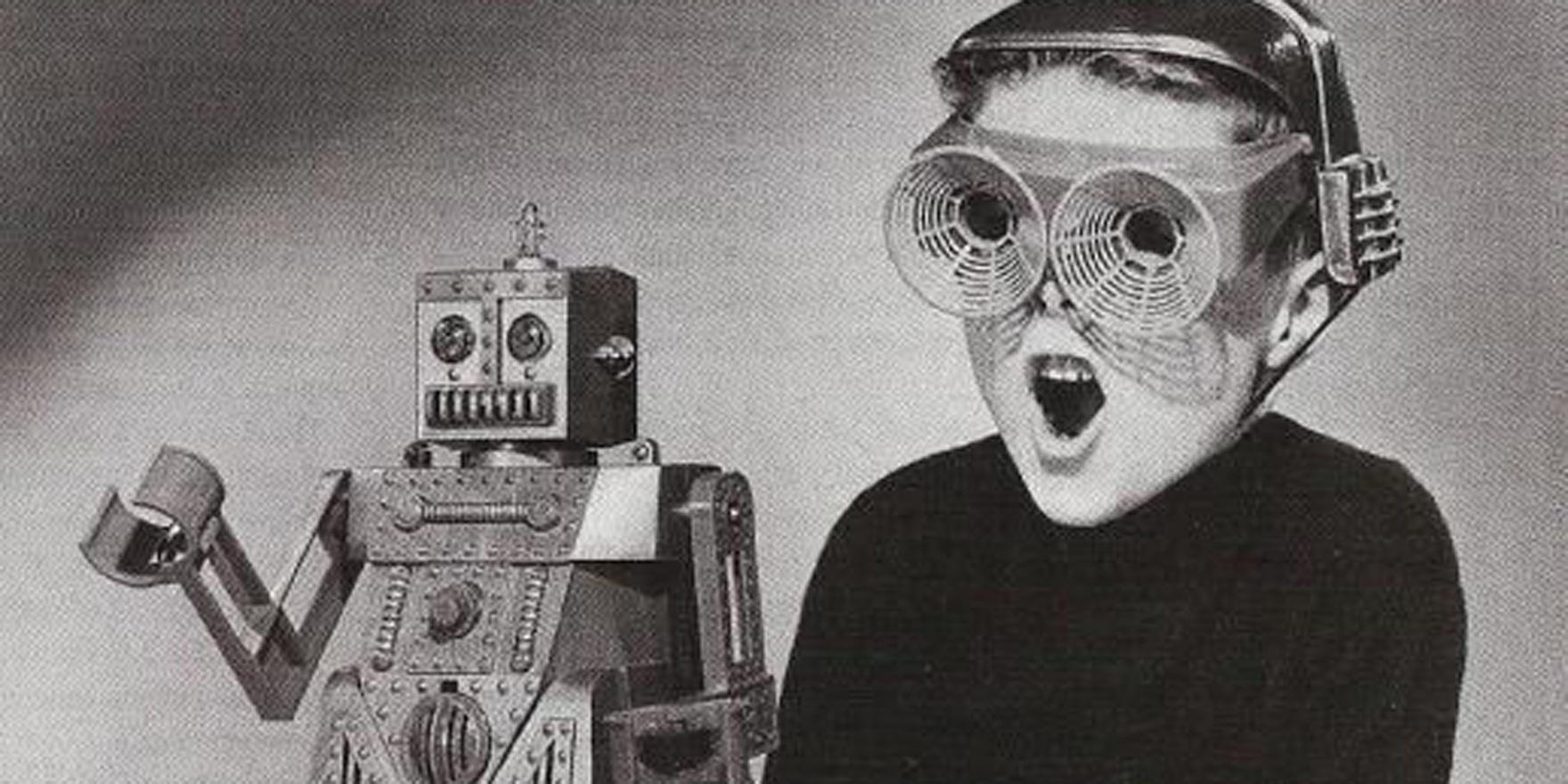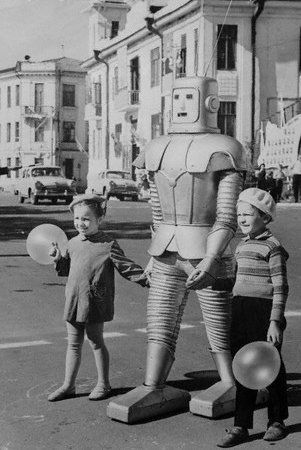Kids of the future will have artificial buddies, virtual reality teachers and robot nannies. Get used to it!
Kids of the future will have artificial buddies, virtual reality teachers or robot nannies. Digital technologies are radically transforming the relationship between children. As I have a six-months-old daughter, I decided to map how our future – mine as a father and hers – and the future of parenting could look like in the light of new innovations.
Digital technologies change social relations
Disruptive technologies are shaping the way we work, we eat, we do shopping or find information. It changes healthcare under the transformation called digital health. Not only the access to and delivery of care, but also the doctor-patient relationship. Namely, it alters the quality of a social linkage which was relatively stable for centuries.
Why would that be different in the most important area of our lives, the family? The rapid swirls of technology started to change the relationship between grandparents, parents, and children. For a while in the past centuries, knowledge about how to survive in the world went down from generation to generation. And while the youth revolted against their adults as part of growing up, the basics of their experiences remained untouched. What having a job, having a family and friends or living in a community meant. Digital technologies change these social experiences profoundly. While your grandparents probably taught your parents how to read maps for finding their way out in cities, you use digital maps. And you are the one showing your parents how to do that on their iPhones. It is the same for taking photos, applying for jobs or chatting with friends.
Digital natives on the rise
The number of young adults and kids who were born surrounded by digital environments or are using digital technology for 5 years or more already – the definition of digital natives by ITU – is growing exponentially. In 2013, ITU estimated that 30 per cent of the world’s youth, meaning 363 million people were digital natives. They suggested that over the next five years, the number of digital natives will more than double. Behind the soaring number stands the decrease in the price coupled with the geographical extension of digital technologies as well as the drop in the age of users. In the most wired areas, it is not strange to see small children watching the same cartoon on their parents’ laptop or tablet repeatedly for hours or taking silly photos of snails with smartphones.
And this is only the beginning. Imagine your kids immersing themselves into VR worlds, having AI friends or artificial teachers while robot nannies supervise them. As transformative digital technologies are at our doorsteps, current and future parents should familiarise themselves with the latest digital tech aimed at kids and try to prepare for its impact. It is really difficult since children growing up with technologies take them for granted; while some parents being “digital immigrants” still remember the time when portable, WIFI-enabled technology was not available 24/7. Parents need to teach their kids how to survive in the digital as well as the real world in the future; how to find the balance between the analog and the digital as well as the real and the virtual.
Current digital technologies for parenting
Today’s digital kids are raised by digital parents. There is as much information available online as many selfies are taken by tourists in Venice in a year. Parents are powered by social communities and Google to find answers to their questions. In the future, various healthcare chatbots will also support them in finding the appropriate drug or the easiest solution to a simple health problem. Although chatbots will not substitute primary care, it will diagnose the easiest symptoms and direct to the GP if necessary. This way, digital health assistants will also take some burden off the shoulders of physicians.
Freaked out wannabe-parents can also prepare for their future babies with baby simulators. A company called Realityworks is the leader of the “sim baby” market manufacturing RealCare Baby 3. It is an infant doll that cries, makes demands of its caregiver, uses GPS and sensors to identify when a baby is not being treated right.
Advanced baby simulators could help future parents prepare for parenthood, even though the experience never replaces the real one. A study actually showed that unwanted pregnancies may not be prevented with their help. I expect virtual reality to lead to a leap in this area as the experience there is much different to what the simple hardware of baby sims can provide. Parents could use VR devices to go through scenarios about how they would react to situations with kids.
Data for raising healthy kids and the risk of constant monitoring
Digital technologies not only allow to know more and more about the world around us but also ourselves and our loved ones. Trackers, wearables, and sensors gathering data about a person’s every biological aspect of life are on the rise. Around a hundred million wearable units to measure health parameters were sold in 2015. It is predicted that 245 million wearable devices will be sold in 2019. There are already tens of millions of wearable sensors and healthcare gadgets in the pockets of people worldwide – and many of them targeting parents and children. From sensors during pregnancy through baby monitors until fitness trackers for kids, the scale of digital health devices for the family is widening. And the trend will continue in the future. As such data can be used to ensure the development of a healthy child in a safe environment.
However, data and digital devices should not be overused. For example, in the case of parents trying to know more about the whereabouts of their beloved kids through tracking technologies such as mSpy, Teen Safe, Family Tracker. A Pew Research Center survey of adults with children 13 to 17 years old published this year found that 61 per cent of parents checked the websites that their teenagers visited; 60 per cent visited their social media accounts and 48 per cent looked through their phone calls and messages. The portion that tracked their teenagers’ whereabouts through their smartphones was 16 per cent.
In a piece in The New York Times, Mary Madden, a researcher at Data & Society, a non-profit research organization, said that we’re moving closer to a world in which parental surveillance becomes opt out instead of opt in. I completely agree with this notion, and while I see the logistical and health&safety benefits of knowing kids’ whereabouts, parents should restrict themselves from turning into the FBI and stalking their children. It would create an unhealthy family dynamic and would not help kids developing into healthy, independent and successful adults.
Artificial buddies are coming
Looking more ahead in the future, the use of VR, AR, artificial intelligence and robotics seems to be inevitable in raising children. No matter whether it is about babysitting, education or play-time, digital technologies have the capacity to completely reshape the experience of being a child and a parent.
Sim babies mentioned above are ancient toys compared to what advanced toys are becoming available. New York-based Elemental Path, for example, develops Cognitoys, dinosaur-shaped toys kids can have a discussion with. It teaches them how to count, how to create stories together (!), remember colours and more. They can sing or play games and they also have amazingly bad word-wits. Toys that use artificial intelligence will become real friends with kids. It must be frightening to some parents now but I expect that my new-born daughter will have real and A.I. friends by the time she becomes a teenager. Seeing how fast A.I. is developing makes me think this is quite inevitable. If for the first time, you have a conversation with an A.I. driven chatbot, you understand how hard it is to distinguish between real and artificial personalities.
Are virtual teachers the future?
While the development of augmented reality (AR) still seems to be in its infancy, its counterpart, virtual reality (VR) is getting mainstream. As VR devices become affordable, and content developed for those becomes immersive and engaging, kids will switch to VR from their smartphones or use the two interchangeably. The experience of playing a game in VR is so unique, I cannot imagine kids staying away from those gadgets. Moreover, VR is not only about games but also about educational apps.
However, parents should consider that VR for their kids will be as television or VHS was for them back then in their childhood. Just another playground and entertainment source. Parents should familiarise themselves with VR and what effects they could have on them. Then they should draw the line for their children based on their experiences. The kids of the future should learn how to distinguish between the real and the virtual, while benefit from the achievements of technologies.
Would you let robot nannies watch your child?
Robot babysitters have been around on the market for almost ten years, not to speak about the machine-nannies known from science-fiction novels, thus the idea is far from new. For example, Avatarmind brings you the iPal – a robot companion looking like the 3D-version of the Teletubbies. The company’s founder, Jiping Wang, told The Guardian, that the small robot for companionship could keep children aged three to eight occupied for “a couple of hours” without adult supervision. In the future, these robots coupled with A.I. could take over human tasks, such as babysitting. Parents could interact with robotic companions from a distance and make sure the kids are safe.
Last year, the iPal was already in production in China. Furthermore, Avatarmind promised it to introduce in the United States in 2017. Many believe that it cannot and should not replace human childcare as robots neither have the empathy nor the sensitivity for taking care of kids. Yet, how is it worse than handing your kid a tablet to watch cartoons for hours? I believe we should have more debate about the issue and incorporate technology into the family’s life consciously and only to the extent which creates a healthy environment for every member.
All-in-all, I believe that kids of the future will have relationships with A.I. friends they highly value. They will have to learn to respect robots as much as animals. (The way we treat other beings reflect upon our inner values, that’s why.) They won’t need the motivation to exercise and live a healthy life. That’s going to be the standard way of life – reached with the help of wearables, trackers and health sensors.
While in my childhood, I had to find a balance between playing video games indoors and playing with other kids outdoors, my 6-months-old daughter will have to find a balance between spending time with technologies and real people. Yet, the proper response is not to get scared and expel technology from our lives but contemplate about it; discuss it and incorporate it into our common future consciously.
Dr Bertalan Meskó is the Medical Futurist, a biotech thinker and keynote speaker.
This blog was originally published on The Medical Futurist.




